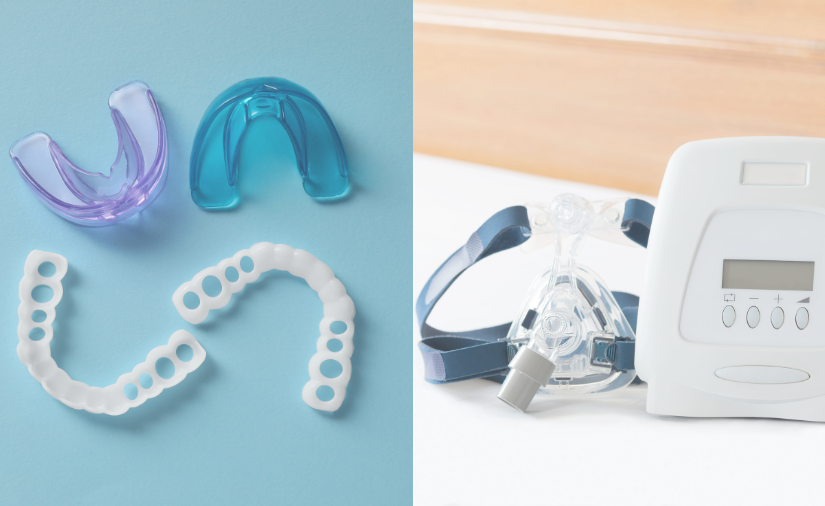By: Dr. Elizabeth Eggert
Obstructive sleep apnea (OSA) is a common sleep disorder that affects 18 million people around the world. It is characterized by pauses in breathing during sleep, which can lead to snoring, daytime sleepiness, and other health problems.
There are several treatment options available for sleep apnea, but two of the most popular are Mandibular Advancement Appliances (MAAs) and Continuous Positive Airway Pressure (CPAP) therapy. While both of these treatments can be effective, they work in different ways and have different benefits.
Let’s explore the differences between MAAs and CPAP therapy and help you determine which treatment option may be best for your individual needs.
Sleep Apnea Treatment Options
First, let’s take a look at all of the treatment options that patients are given when first diagnosed with OSA:
- Lifestyle changes: Losing weight, quitting smoking, avoiding alcohol and sedatives, and sleeping on your side may be recommended to improve sleep apnea symptoms.
- Oral appliance therapy: This involves wearing a mouthguard-like device (like an MAA) that helps to reposition the tongue and jaw to keep the airway open during sleep.
- Continuous Positive Airway Pressure (CPAP) therapy: CPAP therapy involves wearing a mask at night that is attached to a machine. This machine delivers air pressure to keep the airway open during sleep.
- Surgery: In some cases, surgery may be recommended to remove excess tissue in the throat or to reposition the jaw.
You and your doctor will be able to review your unique situation to determine which of these solutions is right for you.
While lifestyle changes can treat more mild cases of sleep apnea, they won’t be able to completely relieve symptoms of more severe cases. On the opposite end of the spectrum is surgery: this sleep apnea treatment is usually saved for the most severe cases of OSA.
The middle ground, then, is where Continuous Positive Airway Pressure (CPAP) therapy and Mandibular Advancement Appliances (MAAs) lie. These are the most popular treatment options among people with sleep apnea. While both treatments can be effective treatment options, they work in different ways and have different benefits.
Benefits of CPAP Therapy
Continuous Positive Airway Pressure (CPAP) therapy is:
- Highly effective: CPAP therapy is considered the most effective non-surgical treatment option for sleep apnea.
- Produces immediate results: CPAP therapy can provide immediate relief from symptoms of sleep apnea, such as snoring and daytime sleepiness.
- Can be used for any level of sleep apnea: CPAP therapy can be used to treat all levels of sleep apnea, from mild to severe.
- Helps improve overall health: CPAP therapy can help improve blood pressure, reduce the risk of heart disease and stroke, and improve overall quality of life.
However, because of the cumbersome nature of the CPAP machine, many people have a difficult time sticking to it over an extended period of time. It’s also difficult to travel with so many people don’t use their CPAP machine during vacations or trips.
Benefits of Mandibular Advancement Appliances
While CPAP therapy is extremely effective, many people can’t tolerate sleeping with the discomfort of the face or nose mask night after night. That’s where Mandibular Advancement Appliances (MAAs) come in: MAAs have an 80% compliance rate over the CPAP’s 40% compliance rate.
In addition to being easier to stick to as a treatment modality, Mandibular Advancement Appliances are:
- Comfortable: MAAs are often more comfortable to wear than CPAP masks, as they are custom-made to fit the patient’s mouth.
- Portable: MAAs are small and easy to travel with, making them a convenient treatment option.
- Non-invasive: MAAs do not require surgery and can be easily adjusted by Dr. Jeff Eggert or Dr. Elizabeth Eggert.
- Effective for mild to moderate sleep apnea: MAAs are often recommended for individuals with mild to moderate sleep apnea who are unable to tolerate CPAP therapy.
Ultimately, the best treatment option for sleep apnea will depend on your specific needs and preferences. Your doctor can help determine the most appropriate treatment option based on the severity of your condition, medical history, and other factors.
Think You Could Benefit from a Mandibular Advancement Appliance?
At Eggert Family Dentistry, we custom-fit mandibular advancement devices for patients with Obstructive Sleep Apnea or other Sleep Related Breathing Disorders. Call us today at 651-482-8412 to schedule a consultation during which Dr. Jeff Eggert or Dr. Elizabeth Eggert can discuss this treatment option with you and answer any questions you may have. Once we’ve decided an MAA is right for you, we can custom-design your device and then calibrate the finished product to make sure it’s comfortable and effective. Contact us to schedule your appointment today!
